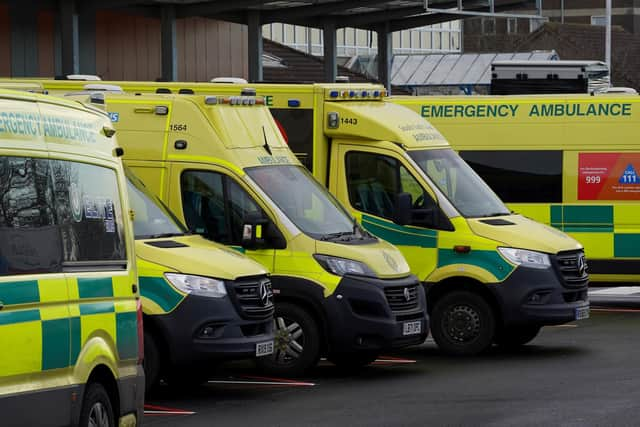Nearly a quarter of ambulance patients waited more than an hour at Wigan's hospitals last week
and live on Freeview channel 276
The Royal College of Nursing said the healthcare system is "dangerously close to overheating completely".
NHS England figures show 93 (24 per cent) patients waited in an ambulance for at least one hour when they arrived at hospitals run by Wrightington, Wigan and Leigh Teaching Hospitals NHS Foundation Trust A&E in the week to Sunday, December 18 – though this was down from 118 (30 per cent) the week before.


Advertisement
Hide AdAdvertisement
Hide AdA further 97 patients were forced to wait between 30 minutes and one hour, meaning 48 per cent of the 394 total ambulance arrivals were delayed by half an hour or more, and at least 184 hours were lost.
The figures cover the week before a 24-hour strike by ambulance staff across England and Wales over complaints of poor working conditions and pay.
NHS targets state trusts should complete 95 per cent of all ambulance handovers in 30 minutes, with all conducted in less than one hour.
More than 16,300 handover delays an hour or longer were recorded across all hospital trusts last week, according to NHS England – up 31 per cent from 12,500 the week before.
Advertisement
Hide AdAdvertisement
Hide AdIt meant 46,000 hours was lost to delays in handing patients over, a significant rise from 29,000 hours recorded a week prior.
A handover delay does not always mean a patient has waited in the ambulance as they could have been moved into an A&E department but the handover was not completed.
Ambulance staff walked out on Tuesday, December 21. Further strike action by staff at five ambulance services on January 11 and January 23 was announced by trade union Unison this week.
The Royal College of Nursing's director for England Patricia Marquis said: "The figures suggest there is absolutely no slack in the system."
Advertisement
Hide AdAdvertisement
Hide AdShe added that there was a serious lack of bed capacity in the NHS, urging the Government to address pay and vacancies for nurses to improve care.
Saffron Cordery, interim chief executive at NHS Providers, said they were expecting this Christmas to be "one of their darkest to date".
“With ambulance handover delays having increased by a third in the last week, trust leaders are extremely worried as strike action threatens to aggravate an already deeply challenging situation," she added.
She urged the Government to talk with unions "as soon as possible".
Advertisement
Hide AdAdvertisement
Hide AdA spokesperson for the Department of Health and Social Care said it is working to increase capacity across the NHS.
“Our number one priority this winter is to keep patients safe and ensure they can access care when and where they need it, which is why we are taking action to reduce ambulance handover delays and boost urgent and emergency care performance," they said.
They said the Government is spending £500m to speed up discharge from hospital to social care, and £150m for the ambulance service to meet winter pressures.
